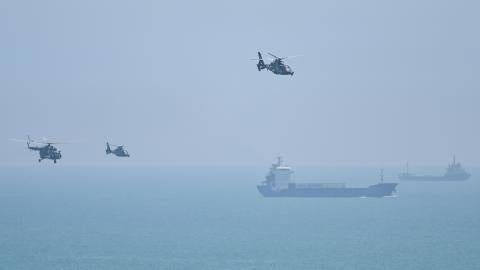As Russia’s war on Ukraine grinds on into its second year, it continues to generate headlines as the largest land war in Europe since 1945. Yet 5,000 miles away, at the opposite end of the Eurasian land mass, a different conflict lies poised to ignite, kindled by another large country’s distortion of a shared cultural and ethnolinguistic heritage to threaten a smaller neighbor’s sovereignty.
Many headlines have also been written on the Chinese Communist Party’s efforts to isolate and strangle the small but defiant democracy on the island of Taiwan. Yet many of these analyses fail to locate the sources of China’s obsession with its neighbor to the southeast. Any effort to neutralize Chinese aggression must begin with one question: why is China so obsessed with subduing a tiny nation of only 23 million people? Examining this question reveals four key motivators animating Beijing’s mania.
First, the Chinese Communist Party sees subsuming Taiwan as central to its Liberation Ideology, a primary source of the CCP’s political legitimacy. The blunt instrument of this evangelization is the CCP’s People’s Liberation Army, today the world’s largest armed force. Animated by the proletarian millennialist zealotry of Marxism-Leninism, the CCP fancies itself the vanguard of a mission to liberate all mankind from the evils of capitalism.
The CCP believes that its liberation mission was upended in 1949 by its failure to wipe out the Chinese Nationalists who fled to Taiwan. Ever since, the CCP’s supreme leader — from Mao (毛澤東) to Deng (鄧小平) to Xi (習近平) — has vowed to finish the job. Beijing brands this takeover as “upholding territorial integrity of the motherland,” yet the CCP regime has since its founding willingly ceded territories dozens of times larger than Taiwan to communist neighbors such as the Soviet Union and Mongolia, and friendly countries such as Burma. The truth lies in the words of Mao, who famously urged that “we must carry on the revolution to its very end.” The CCP sees Taiwan’s existence as a flourishing democracy as a major stain upon its domestic reputation, and views capturing Taiwan as the ultimate fulfillment of a decades-long ideological commitment.
Second, the CCP under Xi is animated by a delusion that China is stronger than the United States and its allies. This braggadocio is not new; indeed, Xi’s recent words expressing the sentiment — “the East’s risen, the West’s declined” — echo those of Mao Zedong more than 6 decades prior, when he said “the east wind is now prevailing over the west wind.” China’s revanchist ambitions therefore stem from a deeply rooted desire to prove itself as a global superpower. Taking over Taiwan, whose security is ostensibly guaranteed by the US and its allies, would prove to the world that Xi is correct in his analysis of the global balance of power.
Third, the CCP remains deeply paranoid that Taiwan’s success in democratizing will have a destabilizing effect on the mainland Chinese populace. Taipei’s advocacy for artistic freedom, its environmental activism, and its spirit of innovation exert an enormous pull on the millions of ordinary Chinese living under Beijing’s stultifying rule. A Taiwan subdued by unrelenting bullying and pressure would prove much less attractive worldwide than a thriving, vibrant democracy among the Chinese diaspora. A Hong Kong-style takeover would eliminate Taiwan’s inspirational power — and its potential to undermine the appeal of Beijing’s hard sell.
Fourth, the CCP’s obsession with Taiwan motivates its military and enables its diplomats. The People’s Liberation Army has built military capabilities that would far exceed its needs in any potential Taiwan campaign, but would serve it well in a larger conflict with the United States. The PLA has made key advances in critical modern warfare capabilities, including in domains such as cyber, space, the deep seas, and supersonic and electromagnetic weapons. The Taiwan obsession also allows Beijing to evade its international responsibilities: when Chinese diplomats become uncomfortable in global forums, they often change the subject by launching into indignant soliloquies on the One China principle. Thus, problems that could benefit from Beijing’s constructive engagement, from North Korean weapons proliferation to Russian aggression in Ukraine, remain festering sores on the liberal international order.
Understanding the four sources of China’s obsession with Taiwan is essential for the US and its allies. For not only does the small island nation serve as a beacon of freedom and democracy; it also straddles a strategic chokepoint in the chain of islands that is vital for a free and open Indo-Pacific region. A free and sovereign Taiwan may be the final obstacle to the establishment of an alternative global order run on Xi Jinping’s terms. Only by thwarting Beijing’s ambitions can the West assure that this new and terrifying alternative never comes to pass.















